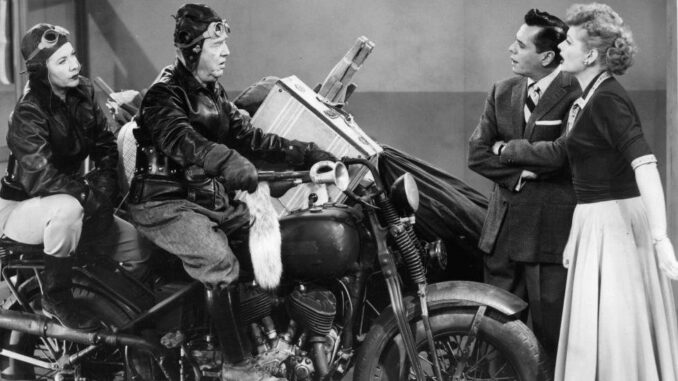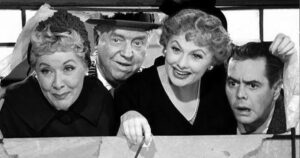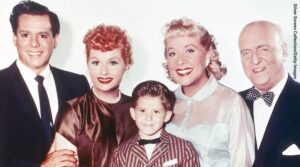
For many fans, ‘I Love Lucy’ wasn’t just a TV show; it was a cultural phenomenon that redefined television. The sitcom, starring Lucille Ball and Desi Arnaz, ran from 1951 to 1957, capturing the hearts of millions. But how did it all end? What was the story behind the final episode? In this article, we’ll explore the show’s ending, the reasons behind its conclusion, and the lasting impact it had on both fans and the television industry.
The Rise of ‘I Love Lucy’
Before we dive into the show’s ending, let’s first appreciate its incredible rise to fame. When ‘I Love Lucy’ premiered in 1951, it quickly became a household favorite. Lucille Ball’s comedic timing, combined with Desi Arnaz’s sharp production skills, made the show an instant hit. But like all good things, ‘I Love Lucy’ had to come to an end.

The Beginning of the End: Season 6 and Changing Dynamics
By the time ‘I Love Lucy’ reached its sixth season, things were starting to shift behind the scenes. Lucille Ball and Desi Arnaz, who were married both on and off-screen, were facing personal struggles that made continuing the show difficult. The strain in their relationship translated into a need to wind things down.
The Final Episode: ‘The Ricardos Dedicate a Statue’
The last official episode of ‘I Love Lucy’, titled “The Ricardos Dedicate a Statue”, aired on May 6, 1957. In this episode, Ricky Ricardo (played by Arnaz) was set to unveil a statue in his honor, while Lucy (Ball) predictably gets into one of her classic messes, trying to help. The episode follows Lucy’s hilarious antics as she accidentally destroys the statue, leading to a chaotic but humorous conclusion.
While the final episode was filled with laughter, it wasn’t originally meant to be the series finale. At the time, no one realized this would be the last episode of the regular series.
Why Did ‘I Love Lucy’ End?

So why did ‘I Love Lucy’ come to an end when it was still such a beloved show? The reasons were complex and involved both personal and professional factors.
- Personal Turmoil: The marriage between Lucille Ball and Desi Arnaz was unraveling. Despite their on-screen chemistry, their personal lives were filled with tension. By 1960, they would divorce, which played a significant role in the show’s conclusion.
- Fatigue and Burnout: Producing a weekly show with such high standards took its toll. Both Ball and Arnaz were exhausted from the relentless production schedule. The show was filmed live before a studio audience, which added to the pressure.
- Shifting to Specials: While ‘I Love Lucy’ ended as a regular series, Ball and Arnaz shifted their focus to producing hour-long specials, known as “The Lucille Ball-Desi Arnaz Show”, which ran until 1960. These specials were a way to continue the beloved characters without the intense demands of a weekly show.
The Legacy of ‘I Love Lucy’
Even though ‘I Love Lucy’ ended in 1957, its legacy has endured for decades. The show set new standards for television production and comedic writing. Lucille Ball became a trailblazer for women in entertainment, while Desi Arnaz revolutionized television with innovations like the three-camera setup and the concept of reruns.
Life After ‘I Love Lucy’
After the show ended, both Lucille Ball and Desi Arnaz continued their careers, though in different directions. Ball went on to star in several other sitcoms, including ‘The Lucy Show’ and ‘Here’s Lucy,’ while Arnaz focused more on behind-the-scenes work in television production. Despite their divorce, both stars maintained a legacy that shaped the entertainment industry for years to come.
The Emotional Impact on Fans
The ending of ‘I Love Lucy’ left fans heartbroken. The show had become a staple of American culture, and many viewers felt like they had grown up with Lucy and Ricky. The abrupt ending of the regular series left some feeling unsatisfied, though the later specials helped ease the transition.
What Was the Real Final Episode?
Though “The Ricardos Dedicate a Statue” is often cited as the last episode, some fans consider the 1957-1960 specials as the true ending. These specials featured longer, more elaborate storylines and showcased Lucy and Ricky’s family life after moving to Connecticut. The final special, “Lucy Meets the Moustache”, aired in 1960 and is sometimes viewed as the real conclusion to the series.
Behind-the-Scenes Drama
The end of ‘I Love Lucy’ was also marked by behind-the-scenes drama. As Lucille Ball and Desi Arnaz’s marriage disintegrated, tensions on set increased. The couple’s divorce, finalized in 1960, shocked fans and added a bittersweet layer to the show’s conclusion.
How ‘I Love Lucy’ Changed Television Forever
Even though the show ended, ‘I Love Lucy’ changed the way television was made. Some of its groundbreaking contributions include:
- Syndication and Reruns: ‘I Love Lucy’ was one of the first shows to be rerun, which set the stage for the syndication model still used today.
- Filming Techniques: Desi Arnaz pioneered the use of a three-camera setup for sitcoms, which allowed for live filming with multiple angles—something that has become a standard in TV production.
Lucy’s Return to TV
Lucille Ball wasn’t ready to leave television just yet. After ‘I Love Lucy’ ended, she went on to star in her own sitcoms, which included ‘The Lucy Show’ and ‘Here’s Lucy’. Though these shows were successful, none ever quite captured the magic of ‘I Love Lucy’.
Why Fans Still Love ‘I Love Lucy’ Today
So, why does ‘I Love Lucy’ remain such a beloved show, even decades after it ended? The answer lies in its timeless humor, lovable characters, and innovative storytelling. Lucille Ball’s performance as the mischievous yet endearing Lucy Ricardo continues to resonate with audiences of all ages.
Where Can You Watch ‘I Love Lucy’ Today?
If you’re feeling nostalgic and want to rewatch ‘I Love Lucy’, you’re in luck! The show is available on several streaming platforms, including Hulu and Amazon Prime. Its continued availability proves just how much staying power this iconic series has.
Conclusion: A Bittersweet Goodbye to ‘I Love Lucy’
The end of ‘I Love Lucy’ was the close of a golden chapter in television history. While the show ended amid personal and professional challenges, its legacy has never faded. From the laughter it inspired to the groundbreaking contributions it made to the industry, ‘I Love Lucy’ will always hold a special place in the hearts of fans. Though it ended on-screen, its influence continues to shape television even today.